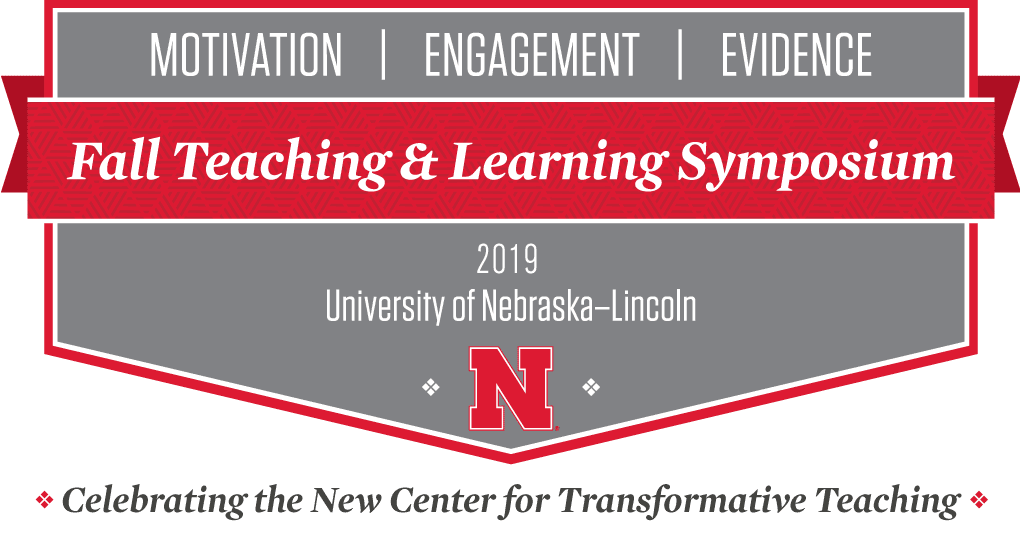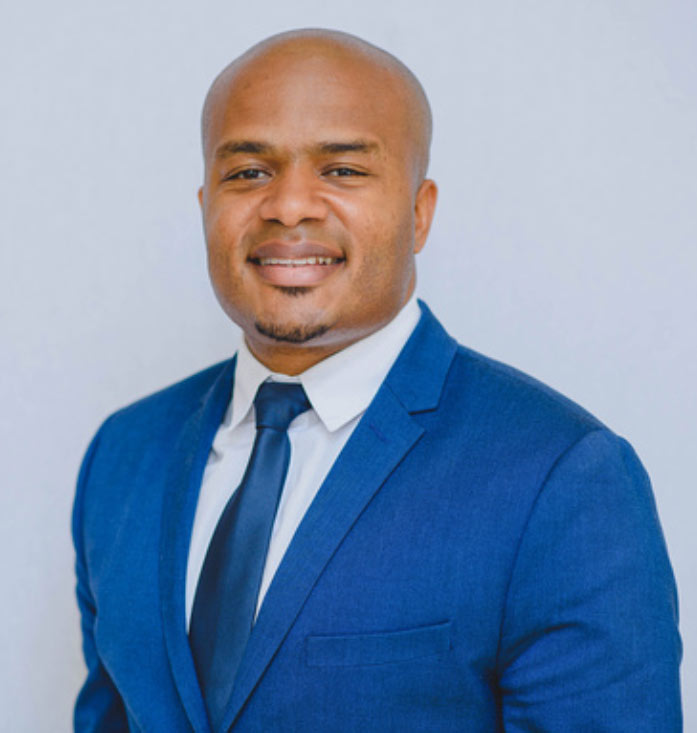
Friday, October 25, 2019
11:00 a.m. to 4:30 p.m.
Check-in begins at 10:45 a.m.
The Office of the Executive Vice Chancellor is pleased to sponsor the Fall 2019 Teaching and Learning Symposium on October 25 at Nebraska Innovation Campus. This symposium provides an opportunity to engage in conversations about teaching and learning, to hear from experts on emerging issues in improving student outcomes, and to network with others seeking to improve teaching at Nebraska.
Schedule of Events
| 11:00 a.m. |
Welcome and Ribbon CuttingGrand opening of the Center for Transformative Teaching and official welcome for inaugural director Nicholas Monk |
|---|---|
| 11:15 a.m. |
Center for Transformative Teaching ExpoInteractive exhibits showcasing the range of services provided by the Center for Transformative Teaching and its campus partners |
| 12:30 p.m. |
Lunch |
| 1:15 p.m. |
Keynote WorkshopLearning for the Future: Leveraging Lessons Learned to Empower Ourselves and the Learners We ServeDr. Carl S. Moore, assistant chief academic officer at the University of the District of Columbia Nebraska's sesquicentennial provides the perfect opportunity to reflect on the future of our learners and how we best prepare them for our global society. How can our instruction continue to meet the needs of an increasingly diverse student body? How do we future-proof ourselves as instructors with the ever increasing rapid advances in technology? In this workshop, we will explore these questions as we learn to value the utility inclusive instructional approaches have for all learners, identify evidence-based strategies that best engage and motivate learners, and make decisions around leveraging new technologies to promote learning. We will reflect on how past and current realities can help us empower learners in and for the future. Carl S. Moore is the assistant chief academic officer at the University of the District of Columbia and also serves as certificate faculty in Temple University’s Teaching in Higher Education program. He has dedicated his career to advancing the field of faculty and leadership development, serving as a department chair at UDC, assistant director of the Teaching and Learning Center at Temple University, co-chair of the POD Network Conference, and as a Middle States Commission on Higher Education peer reviewer. He has developed and taught a variety of courses in education and has served in numerous roles charged with enhancing student success. He is passionate about discovering innovative ways to increase educational effectiveness and organizational alignment through technology. Moore received his Master of Arts in higher education administration from The Ohio State University and his doctorate in urban education from Temple University. 
|
| 2:45 p.m. |
Break and Raffle |
| 3:15 p.m. |
Concurrent Breakout SessionsMaking Education Affordable: Using Open Educational ResourcesBeverly Russell, associate director, Center for Transformative Teaching; Charlene Maxey-Harris, chair and associate professor, University Libraries Much national attention has focused on the substantial benefits, for students and faculty, of Open Educational Resources and other “affordable content” options. To help lower textbook costs for students, the university provides a variety of opportunities and resources to assist faculty with adopting OER and affordable content. Why and how might one want to use OER? This session introduces the university's resources, provides example uses, and invites participants to explore the Open Textbook Library, part of the Open Textbook Network, of which the university is a member. Participants who choose to contribute a textbook peer review to the OTL will receive a small stipend. Bringing your laptop is helpful, but not necessary. Building Student Belonging and Self-Efficacy: Using the Husker Student POWER FrameworkKathy Castle, assistant professor of practice, communication studies; Toni Anaya, associate professor and instruction coordinator, University Libraries; Joseph Dauer, assistant professor, natural resources This session will provide attendees with an overview of the Husker Student POWER (Purpose, Ownership, Well-Being, Engagement, and Relationships) framework intended to support student success at the university. We will explain how instructors can engage with the framework to purposefully build their students’ sense of belonging and self-efficacy, and ultimately support their success in the classroom and on campus. The panelists will review how members of our campus community are using the Husker Student POWER framework to support student success. Attendees will be invited to identify existing strategies and generate new approaches for instructors to connect their instructional practice to Husker Student POWER. Speed Sessions: "Small" Teaching Tips to Promote Effective LearningStephanie Bondi, assistant professor of practice, educational administration; Sabine Zempleni, assistant professor of practice, nutrition and health sciences; Uchechukwu Jarrett, assistant professor of practice, economics; Eric Buhs, associate professor, educational psychology; Jill Martin, assistant professor of practice, journalism and mass communications; Mary Zeleny, lecturer, educational psychology; Tyler White, associate professor of practice, political science; Katherine Nashleanas, lecturer, geography; Eileen Boswell, graduate teaching assistant, teaching, learning and teacher education Facilitated by Steven Cain, instructional designer, Center for Transformative Teaching; and Julia Remsik Larsen, instructional designer, Center for Transformative Teaching In this speed session, a series of five-minute talks will describe “small” teaching tips and hints that faculty have found engaging for students while promoting effective learning and implementable without overhauling their entire approach to teaching. Participants will have the opportunity to consider how they would apply a strategy to their class and will receive handouts outlining strategy, research, steps in implementation, examples, and contacts. 21st Century Syllabi for 21st Century LearnersKristin Malek, assistant professor, event management extension specialist; Lori Romano, director, First-Year Experience and Transition Programs; Sydney Brown, assistant director, Center for Transformative Teaching What's less fun than writing a syllabus? Reading one. In this panel session, we'll examine how these oftentimes dull, policy-filled documents impact students and explore how we can design them in student-centered ways to more effectively support learning and engage students in our courses. Kristin Malek will discuss how to communicate grading schemes using a menu-style approach. Lori Romano will share small changes that have a big impact for first-year students. And finally, we'll look at ways to pique students' curiosity and set a tone for the learning community we hope to establish. Questions, Clickers, and Contracts: Investigating Pedagogical Approaches that Provide Better Insights and Outcomes for Student LearningBrian Couch, associate professor of biological sciences; Chad Brassil, associate professor of biological sciences This session provides a summary of empirical investigations that demonstrate how different question formats affect student responses, reveals the impact of clicker questions on different student populations, and suggests that study contract participation improves student success. Participants will consider how these findings might apply in their own courses and disciplines. Lessons Learned from ACE AssessmentPatricia Sollars, director of undergraduate education programs ACE 4, 5 and 6 Leadership Fellows will offer insights gained from the 2018-2019 ACE assessment process. Learn what they discovered and what suggestions they have for strengthening our processes. Are there lessons that can be applied to this year’s ACE 7, 8 and 9 reporting? Bring your questions and comments to share! |
| 4:30 p.m. |
Symposium Adjourns |
If you have questions or need additional information, please contact Beverly Russell at brussell1@unl.edu or 402-472-4358.
Visit the symposia archive page to download presentation resources and view the schedules for previous semesters' events.